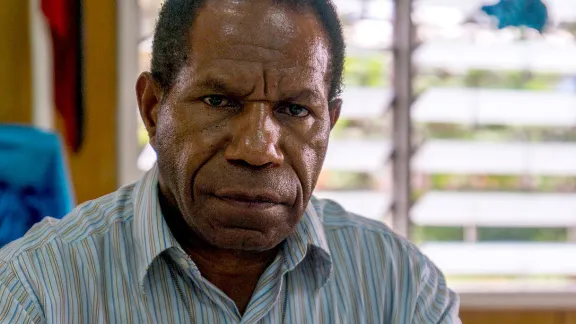
Bishop Jack Urame congratulates church members for 130 years of Lutheran mission in Papua New Guinea, which was celebrated on 8-10 July. He says it is important to recapture Jesusâ unique approach of preaching against social injustices. Photo: ELCPNG
Bishop Urame seeks greater focus on social injustice
(LWI) - The Evangelical Lutheran Church of Papua New Guinea (ELCPNG) has celebrated 130 years since it was founded, and 40 years as an autonomous church.
In a statement to church members, and local and international partners, Bishop Jack Urame pays tribute to those who started the church and ensured its continuity and shares his conviction of “a bright future for our church”. The 8-10 July celebrations took place at the Sir Ignatius Kilage Stadium, Lae.
There was motivation “to stand together on the occasion of our celebration with the motto: ‘My Day, My Time, My Church, I Stand,’" he says.
On 12 July 1886, German missionary Rev. Johannes Flierl arrived at Finschhafen on the eastern shores of Papua New Guinea and established the first Lutheran mission at Simbang. Over the years, the sustained work of overseas missionary workers, local pastors and evangelists led to the growth of the church. It held its first synod in 1956 and elected Dr John Kuder from the United States as the first presiding bishop. The ELCPNG installed its first indigenous leader Bishop Zurewe Zurenuo in 1973, and became autonomous on 11 July 1976, the same year it joined The Lutheran World Federation (LWF).
The role of the church in society is not only to preach, teach and sing hallelujah. It has an obligation to address the suffering of our people.
Urame pays tribute to “the champions of mission” who encountered many difficult circumstances in establishing the church. “Without their sacrifices, the ELCPNG would not be what it is like today. We salute them for laying the foundation on which we stand.”
Holistic and realistic approach
The bishop sees this year’s double celebrations as an occasion for church members to renew the pledge made 40 years ago to be faithful to the Gospel of Jesus Christ and address society’s needs in a holistic and realistic way.
On the church’s vision for the next four decades Urame says it is critical to redefine its vision so that its ministry corresponds to the changing times. “The role of the church in society is not only to preach, teach and sing hallelujah. It has an obligation to address the suffering of our people. We need to recapture the mission of Jesus who took a very unique approach when he preached against social injustices.”
For ELCPNG, this means advocating against economic inequalities and unequal distribution of resources, unfair business deals, corruption and greed, he explains.
Papua New Guinea became independent from Australia in 1975. More than 80 percent of its population of 7.5 million people lives in the rural areas, depending on agriculture as the mainstay. Despite the mining sector’s significant contribution to the economy, unequal distribution of resources means tens of thousands of people still have limited access to basic services such as affordable health care.
Education and health facilities
The ELCPNG runs 490 educational institutions including primary and secondary schools, a teacher’s training college and a vocational school. Its 81 health facilities include hospitals, clinics and a health workers’ training school.
“The church continues to embrace the mission concept of Christ to serve the needy and the marginalized in society. While the church is aware of its own limitations to meet the basic needs of the people, it takes this as an important mission obligation and will continue to complement the government's delivery of social services,” Urame notes.
He says educating pastors “remains the center of the life of the church,” which is growing, with an estimated 1.2 million members in 17 districts. The Lutheran church has three theological institutions that train pastors, evangelists, church musicians and administrators. This emphasis is important in order “to overcome the generation gap so that the mission continues. There is great desire to carry the Miti (Gospel) and move the church forward,” the bishop adds.
The Evangelical Lutheran Church of Papua New Guinea is one of two LWF member churches in the country.


